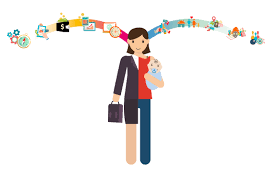
Introduction
Work-life balance is a crucial issue for working women, especially those with young children. It can be challenging for women to balance their work and personal lives, particularly when they are expected to juggle multiple responsibilities. The pandemic has only exacerbated this issue, as many women have had to work from home while also caring for their families.
One of the biggest challenges facing women in the workplace is harassment. Women are often subjected to various forms of harassment, including sexual harassment, which can have a profound impact on their mental health and overall well-being. It is essential for employers to create a safe and supportive working environment for women, where they can feel respected and valued.
Another factor that can contribute to work-life balance issues for women is the lack of flexibility in the workplace. Many women are forced to choose between their careers and their families, as they are unable to find a job that allows them to balance both. This is particularly true for women who have young children or elderly parents to care for. Employers can help by offering flexible working arrangements, such as part-time work or remote work options.
Table of Contents
Overall, work-life balance is a critical issue for women in the workplace. Employers must do more to create a supportive and flexible working environment that allows women to balance their work and personal lives. By doing so, they can help to ensure that women are valued and respected in the workplace and can reach their full potential.

Meaning of Work-Life Balance
Work-life balance refers to the idea of balancing your work responsibilities with your personal life responsibilities. It is important to maintain a balance between the two so that you can lead a happy and healthy life.
Here are some key points to help beginners understand the concept of work-life balance:
- Set Priorities: Make a list of your priorities and divide them into two categories, work and personal. Identify the things that are most important to you in both areas and try to balance your time and energy accordingly.
- Learn to Say No: Don’t take on more work than you can handle. It’s important to know your limits and be able to say no when necessary. This can help reduce stress and prevent burnout.
- Take Breaks: Take regular breaks throughout the day to recharge and avoid burnout. Go for a walk, meditate or do something else that helps you relax and clear your mind.
- Exercise: Exercise is important for maintaining good physical and mental health. Make time for regular exercise, even if it’s just a short walk or a few minutes of stretching.
- Disconnect: It’s important to disconnect from work when you’re not working. Turn off your work phone, computer and email when you’re off the clock. This will help you recharge and avoid burnout.
- Set Boundaries: Set boundaries between work and personal time. Try to avoid working after hours or on weekends. If you have to work during off-hours, set a specific time limit and stick to it.
- Prioritize Sleep: Get enough sleep every night. Sleep is essential for good physical and mental health. Make sure to prioritize it and get the recommended 7-9 hours per night.
- Take Vacations: Take regular vacations to recharge and avoid burnout. Plan ahead and make sure to disconnect from work while you’re away.
- Seek Support: Seek support from family, friends, and coworkers. Talk to them about your work-life balance and get their feedback and advice.
- Evaluate and Adjust: Evaluate your work-life balance regularly and make adjustments as needed. Priorities can change over time, so it’s important to be flexible and make changes when necessary.

Work-Life Balance Post Covid
The world of work is changing rapidly, and by 2023, we can expect to see significant shifts in the way we work and the nature of work itself. Here are some key trends to watch for:
- Remote work will become even more prevalent. The COVID-19 pandemic has accelerated the shift towards remote work, and by 2023, it is likely that many companies will continue to embrace remote work as a way to reduce costs and increase flexibility.
- Artificial intelligence (AI) and automation will continue to transform the workplace. AI and automation have already had a significant impact on many industries, and by 2023, we can expect to see even more jobs being automated or augmented by AI.
- Skills and training will become more important than ever. As technology continues to evolve and the nature of work changes, it will be essential for workers to stay up-to-date with the latest skills and technologies. Lifelong learning and upskilling will become critical for career success.
- Work-life balance will remain a critical issue. Despite the increasing flexibility of remote work, many workers still struggle to maintain a healthy work-life balance. Companies will need to take proactive steps to support their employees’ well-being and ensure that they are not overworked or burnt out.
- Diversity and inclusion will continue to be a priority. As the workforce becomes increasingly diverse, it will be essential for companies to create inclusive workplaces that celebrate and support workers from all backgrounds.
Happy Work Life for Women
A happy work life is essential for both personal and professional well-being. When we are happy at work, we are more productive, engaged, and motivated. We also experience greater job satisfaction and are more likely to stay with our employers for the long term.
To achieve a happy work life, it is essential to find a job that aligns with our values, interests, and strengths. When we are passionate about our work and feel a sense of purpose, we are more likely to be happy and fulfilled in our jobs.
Additionally, it is important to cultivate positive relationships with colleagues and management. When we feel supported, valued, and respected in the workplace, we are more likely to be happy and engaged in our work.
Other factors that contribute to a happy work-life include a healthy work-life balance, opportunities for growth and development, and a positive work environment that fosters creativity, collaboration, and innovation.
It is essential to recognize that achieving a happy work life is a journey, and it requires ongoing effort and commitment. By taking proactive steps to cultivate a positive work environment, prioritize well-being, and invest in personal and professional growth, we can create a happy and fulfilling work life that brings out the best in us.
The world of work is changing rapidly, and by 2023, we can expect to see significant shifts in the way we work and the nature of work itself. To thrive in this changing landscape, workers and companies alike will need to be adaptable, flexible, and committed to continuous learning and improvement.
Mistakes We Do in Work-Life Balance
Work-life balance is crucial for maintaining a healthy and productive lifestyle. However, sometimes we make mistakes that can affect this balance. Here are some common mistakes we make in work-life balance:
- Overworking: One of the most common mistakes we make is overworking. We often believe that the more we work, the more successful we will become. However, this is not true. Overworking can lead to burnout and can have negative effects on our health and relationships.
- Procrastination: Procrastination is another common mistake we make. We often put off tasks until the last minute, which can lead to stress and anxiety. To avoid procrastination, it’s important to prioritize tasks and create a schedule.
- Lack of boundaries: We often struggle with setting boundaries between work and personal life. This can lead to us being constantly available for work and not being able to switch off. It’s important to set clear boundaries and communicate them to colleagues and family.
- Multitasking: Multitasking is often seen as a desirable skill, but it can lead to decreased productivity and increased stress. It’s important to focus on one task at a time and avoid distractions.
- Neglecting self-care: We often neglect self-care in favour of work, which can lead to burnout and decreased productivity. It’s important to prioritize self-care activities such as exercise, sleep, and relaxation.
- Perfectionism: Perfectionism can lead to stress and anxiety as we strive for unattainable goals. It’s important to set realistic goals and accept that mistakes and failures are a natural part of the learning process.
- Lack of communication: We often fail to communicate our needs and concerns with colleagues and family. This can lead to misunderstandings and added stress. It’s important to communicate effectively and express our needs and concerns.
- Failure to delegate: We often believe that we can do everything ourselves, but this is not always possible. It’s important to delegate tasks to colleagues and family members to avoid burnout and increase productivity.
In conclusion, work-life balance is important for maintaining good physical and mental health. It requires setting priorities, learning to say no, taking breaks, exercising, disconnecting, setting boundaries, prioritizing sleep, taking vacations, seeking support and regularly evaluating and adjusting your balance. With the help of this write-up, beginners can start to achieve a better work-life balance and lead a happier, healthier life.
